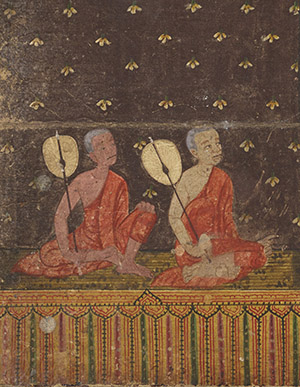Siamese Sampler:
- Conference Schedule

On exhibit August 8, 2016 - October 7, 2016
Penn is home to one of the largest collections—roughly 10%—of Thai manuscripts held in North American institutions.* Thai manuscripts can be either unbounded, made from palm leaves, or folded concertina, made from the bark of the streblus asper tree, known in Thai as khoi. They are written in the languages of Thai and/or Pāli, and can be written in a variety of scripts. The genres of Thai manuscripts include both religious and secular works, such as astrological treatises and legal documents.
This exhibition highlights a sampling of the rich variety of Thai manuscripts held in the Penn collection, including one of the most exquisite specimens of an illuminated Thai manuscript—the Abhidhamma Chet Kamphi (Ms. Coll. 990, Item 5). Other religious works in this exhibition include commentary on the Dhammapada, and a Thai translation of some of the Gospels of the Bible. The exhibition also includes three, rare manuscripts, all concertina and written on black khoi: a government treatise; an elementary Thai lesson book; and a volume from the epic poem, Phra 'Aphaimanī, composed by Sunthorn Phū (1786-1855), a royal poet considered the Shakespeare of Thailand.
* Penn owns 57 Thai manuscripts. There are roughly 650 manuscripts held by institutions in the Americas.
Tuesday, September 6, 2016, 2:00 - 7:00 PM
Conference and exhibition reception
Schedule
2:00 Welcome and Introduction
Will Noel (Director, Schoenberg Institute for Manuscript Studies)
2:10 Keynote
Scattered Leaves: Twenty Years of Searching for Thai Manuscripts
Justin McDaniel (Penn)
3:00 Session 1
Teachers, Healers, and Accidental Diplomats: Early Protestant Missionaries in Siam
Eva Pascal (Boston U.)
Early Indic Eschatology: Vilification in Buddhist Hell Literature
Travis Travis (Temple U.)
3:50 Coffee break and exhibition viewing
4:20 Session 2
The Life and Works of Sunthorn Phū: The Shakespeare of Thailand
Paul McBain (Penn)
The Sampler: Exhibition summary and excerpt from Phra 'Aphaimanī
Susanne Ryuyin Kerekes (Penn)
5:00 Reception
This talk opens the conference with an overview of Thai manuscripts and the field.
This paper explores the impact of early American Protestant missions in Siam within the social and political context of the nineteenth century. In order to gain and maintain royal permission to introduce Christianity in the kingdom, U.S. missionaries cultivated a strong relationship with the monarchs and state officials, which heightened missionary contributions to modernizing the kingdom. This paper also seeks to understand the symbiotic relationship between protestant missionaries, Siam, and the United States, as Protestant missionaries came to represent U.S. interest as Consuls and became incorporated as both official and unofficial advisors to the monarchy.
This talk explores the early Indic concept of hell and how it can be used in providing an ethical narrative for Buddhist canonical literature. From an analysis of the Pāli Sutta Pitaka, I extracted a hierarchical structure generated from over eighty two suttas. By looking at the kammic misdeeds that are deemed most unforgivable on a hierarchical scale, three figures arise who are vilified in early Buddhist literature. From this analysis, I hope to illustrate the complexities that arise from the small subset of suttas pertaining to the worst kammic misdeeds and how they may have influenced the later composition of canonical literature.
Sunthorn Phū (1786-1855) is known as 'the Shakespeare of Thailand.' Every nation has its own 'Shakespeare' but, in this case, the analogy is illuminating. As a deeply reflective artist coming about at a time of great change, Sunthorn Phū provides a fascinating insight into the values and cares of the early Bangkok period. This talk will provide a summary of his rambunctious life, his place in modern day Thai culture as well as an overview of his works.
The mini-conference is concluded with a summary of the exhibition, and a brief reading of Sunthorn Phū's Phra 'Aphaimanī from the volume held in the Penn collection.